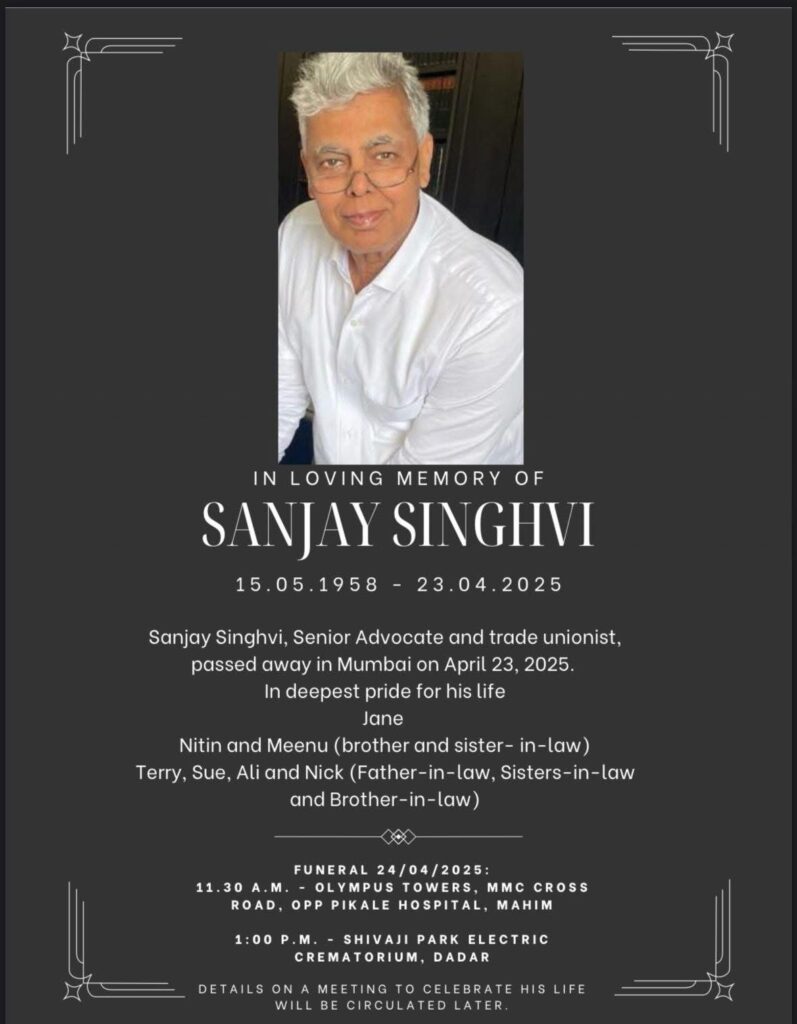Dr K R Shyam Sundar
I first met Sanjay in 2010 when I was doing a project on the theme of non-standard workers and social dialogue practices in India (the first ever project initiated by the International Labour Organisation in the world at that time). His “office” was situated in the slums of Dharavi. The office was as disorganised as it could be with poor furniture and papers generously strewn around. I was doubtful whether I was visiting the right place and the right person!
He arrived a little late which is not unusual for a lawyer and that too in Mumbai. Since I was aware of his ideological orientation I was prepared for the doctrinal language of Marxism; instead, he gave me numerous live cases for his arguments against globalisation. Since the project was on collective bargaining by and for the non-standard workers in many cases I drew a blank in my field studies and I did not hope to find anything different here.
However, much to my delight and relief, he gave me several documents – he summoned a couple from the plant in Pune. His trade union – the Trade Union Centre of India (‘TUCI’) – organised all kinds of unorganised workers in the labour market. I took copious notes of the conversation apart from recording them. Many trade union leaders do impressive and even valiant work on the field but are poor in assembling their thoughts and maintaining materials. In Sanjay’s case, even though organising the documents was poor, he could articulate both orally and via pen. He continued the rich colonial tradition of union leaders being excellent lawyers and writers.
By that time most Industrial Relations scholars had read Jane Cox’s brilliant critique of the SAIL judgment (2006) (as it is called) which took away the crucial right of regularisation of contract labour upon the abolition of the contract delivered in the Air India case (1996). Around the time of the SAIL decision, the Supreme Court’s judgment in the Uma Devi case dealt a severe blow to the rights of marginalised workers (casual workers). Two judgments, viz. the SAIL and the Uma Devi cases, among others, gave a mortal blow to the rights of unorganised workers.
SAIL and Uma Devi judgments were haunting the trade union and working-class movement and they became very hesitant to knock at the doors of the judiciary. As an important member of the Indian Society of Labour Economics (ISLE), in 2009, I organised a “Panel Discussion on Contract Labour in India” at its annual conference at Dharwad and invited experts from several realms. Naturally given my fresh and warm relationship and the intellectual background of Jane and Sanjay, I invited them to be panelists at the Conference. Post-proceedings, noting the rich discussion that emanated in the panel discussion, Prof. T.S. Papola endorsed Prof. Alalkh Sharma‘s idea of bringing out a book on the panel theme.
In 2011 the edited book was published containing articles by Jane and Sanjay separately. I was singularly lucky to have the contribution by late Prof. Papola to the edited volume of mine. By then, the neo-liberal doctrine had penetrated many of the realms of economy and polity. Some other judgments berated the rising trend of attractive neoliberal mantras of globalisation and liberalisation influencing the judgements and bemoaned the decline of judgments based on constitutional principles and values. In fact, fellow Justices mourned these trends in their judgments – the judicial shift created consternation, if not alarm. So, their articles produced significant interest in the academic world and the volume was well received. By now we have cemented a warm relationship.
In 2011-12, I did a project for the ILO on the trends in collective bargaining in India. Naturally, I interviewed Sanjay. He generously parted with as many judgments as he could apart from providing “live cases” of union avoidance to union-busting strategies of employers and the increasing “uneasy” relationship that was building up between the State and capital. In fact, he and Jane were associated with many of the well-known legal battles and struggles. Post-Hindustan Lever lockout in 1989 and since the early 1990s, contestable closures and workers’ retrenchment (often in the garb of VRS) were being often attempted by the managements in Bombay/Mumbai.
Over the years de-industrialisation of Mumbai took place. Workers had no other alternative save legal battles. So a fierce wave of litigation took place while at the same time unions tried to reach out to the MNCs through their respective global union federation workers in food, pharma and chemical industries located outside Mumbai. A legal group of ex-employees of these MNCs, especially the Hindustan Lever emerged in Bombay and Pune. Many a legal battles involved Jane and Sanjay. So, Sanjay’s experiences were important for me as a researcher. By then he was involved with high-profile cases like Jet Airways and many cases in the civil aviation sector, among others.
During this project, I learnt from him (and Arvind Shrouti) the “sly” managerial strategies to bust unions and achieve easy numerical labour flexibility. Later this knowledge greatly helped me in my teaching of courses relating to trade unions, collective bargaining and industrial conflict in XLRI, Xavier School of Management. I have had many discussions with him and Jane on the question of labour issues over these years and both responded with patience and warmth.
It is in these contexts the labour law reforms debate reached its shrill peak. Employers complained of labour institutions like trade unions, collective bargaining and labour laws as introducing rigidities in the working of the market forces and called for tough regulations on the working of these institutions and withdrawal of state intervention. Trade unions since the early 1990s and even now have been agitating against these reform measures at the national level.
I conceived of an edited volume on the theme of Labour Law Reforms and invited people from various fields to contribute articles to it. Naturally, Sanjay was one of the contributors. He made interesting arguments in his article “Changes in Labour Laws: Lessons from History” in the edited book. He detected cyclical relations between big international events like the Russian Revolution leading to the passage of labour laws and global institutions like the ILO and vice versa. He took deep dives into labour history to connect the dots of his argument. He also recognized the significant contribution to the passage or reform of the labour laws – for example the Trade Unions Act, 1926 could be attributed to the struggles which started in the Madras Province.
have had many discussions with him and Jane on the question of labour issues over these years and both responded with patience and warmth. People at the trade unions office often spoke highly of his superb qualities as a legal practitioner. He used three methods to bring out welfare and betterment of working conditions of workers, viz. organizing the marginalised workers into trade unions, conducting struggles and fighting legal battles.
One of the themes of ILO has been “formalising Informality” and he was a sterling example of executing this theme into a reality. For example, he used litigation to regularise the services of 2,700 workers in the Brihan Mumbai Corporation (BMC). His is one of those cases in which the arguments and facts marshalled by him enabled the judges to pierce the veil and see the reality behind the sham contract labour system, which was adopted to deny due rights and privileges to workers (see this judgement from 2016 for instance).
I am sure Jane would roll out numerous such cases where they together or he alone won precious labour rights especially for the unorganised workers. There are all sorts of trade union leaders. Some give long winding sermons on globalisation and its impact on labour rights; others discuss some specific events upon gentle pushes. Others give documents and we are left to make sense of them. Then, there are union leaders who not only provide information and documents but also discuss and provide ideas. Sanjay belonged to the last vanishing tribe.
It is indeed my privilege that I met Sanjay and Jane and knew them for so long. In his demise, the working class movement has lost a humanist, a brilliant labour lawyer and a valiant warrior. I know not what will happen to the Jane-Sanjay “partnership”. He told me (others confirmed) that he would legally contest the four Labour Codes upon notification. The said project has suffered a severe blow with the demise of Sanjay. Jane will surely continue to receive professional and other forms of support from her colleagues and legal fraternity. She is as tough as anyone could be. So far, it has been an inspirational and mind-boggling legal work. (IPA Service)
Courtesy: The Leaflet
The author is professor of practice, HRM Area, MDI, Gurgaon.

 High Time We Rediscover Marx, The Peerless Materialist Philosopher
High Time We Rediscover Marx, The Peerless Materialist Philosopher 